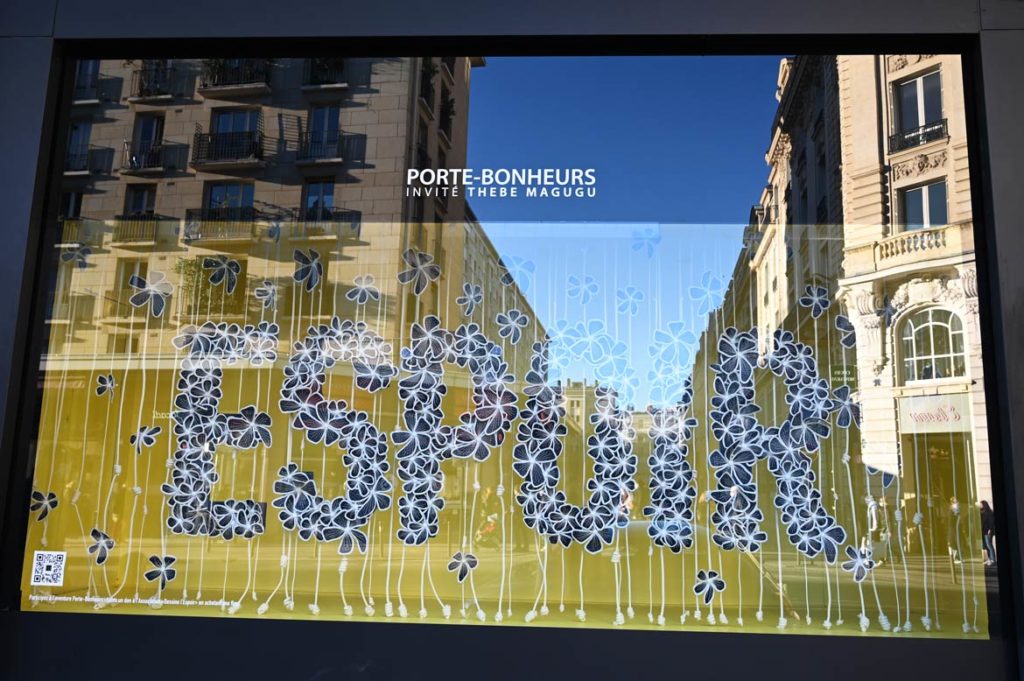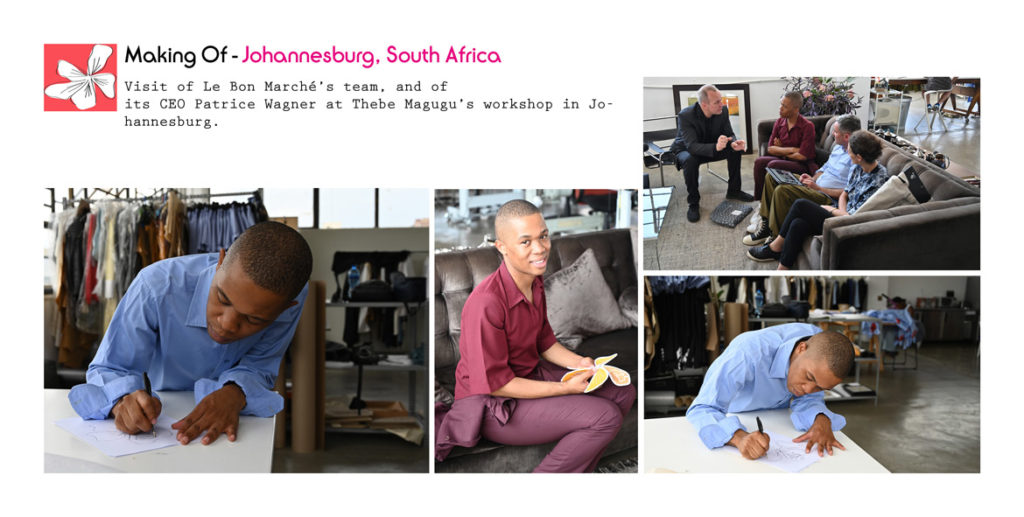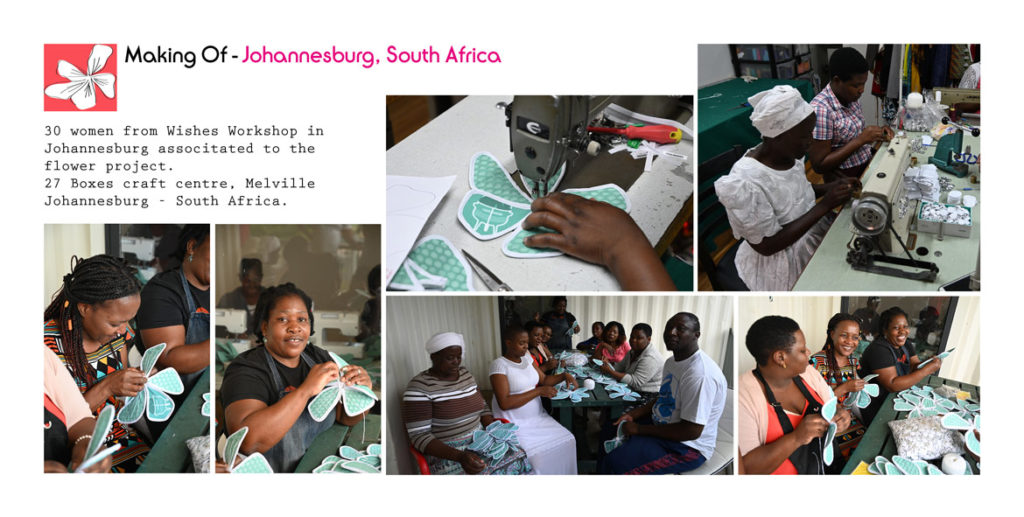The fantastic hanging garden imagined by parisian department store “Le Bon Marché Rive Gauche”, composed of thousands of flowers designed by Thebe Magugu and made by 120 women supported by the NGO Designing Hope in Southern Africa, has anabled anew project to blossom: “The Garden of Skills” in Eswatini.
The “Porte-Bonheurs” project set up by the Bon Marché Rive Gauche has given rise to one of the most beautiful human adventures undertaken by Designing Hope association:
– First of all, 120 women from South Africa and Eswatini were involved in the production of these 20,000 flowers, generating an income for them in 2020 that enabled them to get through the Covid crisis with greater serenity.
– The sale of the flowers now makes it possible to raise the funds needed to set up the “Garden of Skills”, a demonstration and training centre in agroecology and agroforestry, but also enabling the women to develop craft skills and micro-project management.
-
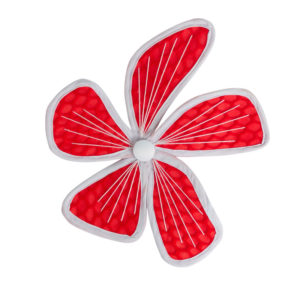 Lucky-Charms flower – Red – Large20,00 €
Lucky-Charms flower – Red – Large20,00 € -
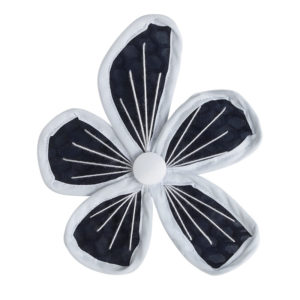 Lucky-Charms flower – Dark Blue – Small15,00 €
Lucky-Charms flower – Dark Blue – Small15,00 € -
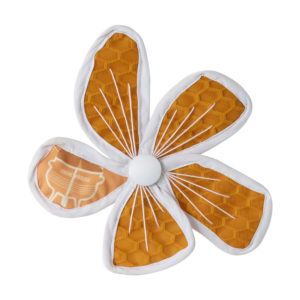 Lucky-Charms flower Orange Small15,00 €
Lucky-Charms flower Orange Small15,00 €
Presentation of the Garden of Skills by Cyrille Varet, President of the NGO.
A look back at the genesis of the project …
A spectacular installation
Like a flower meadow in weightlessness, these multicoloured flowers crafted as brooches were stitched onto innumerable vines, suspended under the two central glass roofs of the department store for the duration of the exhibition.
They are on sale for the benefit of Designing Hope at 15 and 20 euros depending on their size on the dedicated website: www.lesfleursdethebe.fr .
Reserve your flower now and contribute to the financing of the association’s new project:
the Garden of Skills, in Eswatini.
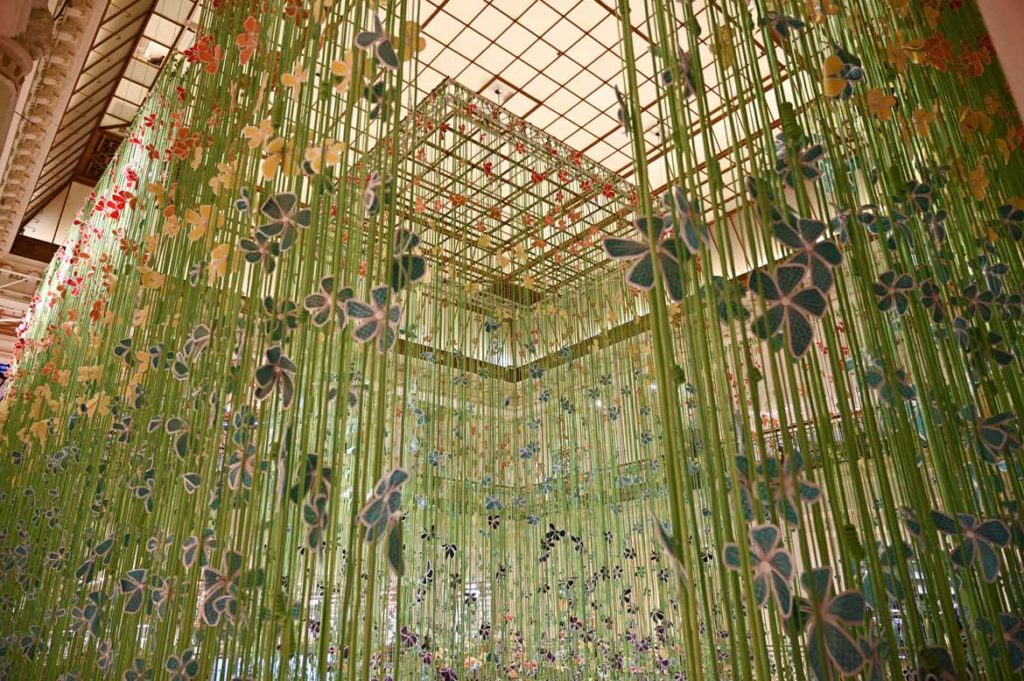
Refinement and generosity
The flowers have been produced in the seven colours of the rainbow and in two sizes. They all bear Thebe Magugu’s signature label and 20% of them include a petal cut from the designer’s printed fabric.
These singular flowers have been conceived as “lucky charms”, which, from Eswatini and South Africa to Paris, carry with refinement and delicacy, a message of generosity, relayed by Véronique Sanson, the association’s patron.
“We are deeply committed to investing in philanthropic works, and it is in our DNA to do so through the prism of fashion,” says Patrice Wagner, Chairman and CEO of Bon Marché group.
This DNA is shared by Designing Hope who, with its “La Mode Dessine l’Espoir” (Fashion Designing Hope) adventure, has marked its 18 years of existence with collaborations with 80 designers, including the biggest names in fashion.
Above, the words written in flowers in the windows of the Bon Marché Rive Gauche.
A significant local impact.
An income-generating activity for women …
More than an artistic gesture, Thebe Magugu’s installation “Porte-Bonheurs” is the scene of a formidable philanthropic project. 120 women in vulnerable situations, were involved in the making of the flowers, in four workshops supported by the association, two in Eswatini in Pigg’s Peak and in Bulembu, and two in South Africa in Roosboom and in Johannesburg.
The first phase of the project, consisting in the making of the 20,000 flowers, was a great opportunity for the 120 women involved. A considerable amount of work, carried out just before the Covid crisis, and which enabled so many families to pass the test of confinement in better conditions.
… Followed by a surge of generosity to fund a new project
All of these benefits will contribute to the implementation of the new Designing Hope project entitled the “Garden of skills” located in the village of Malanti in Eswatini.
The idea? To bring together on the same site a forest garden (associating trees that fertilize the soil with market gardening) and a training and activity centre in the field of agroecology, crafts and micro-project management, open, in particular, to underprivileged women and youth. The “Garden of Skills” will provide them with equipped workshops for sewing, handicrafts, the processing and conservation of garden products and the acquisition of knowledge in nutrition.
The installation of cabins on the site will make it possible to welcome solidarity tourism and accommodate volunteers who can share their know-how during their stay. In the long term, they will constitute an additional resource for the self-financing of the “Garden of skills”.
Partnerships will also be forged with local schools, partners of the association, to offer workshops on agro-ecology, environmental awareness and nutrition.


